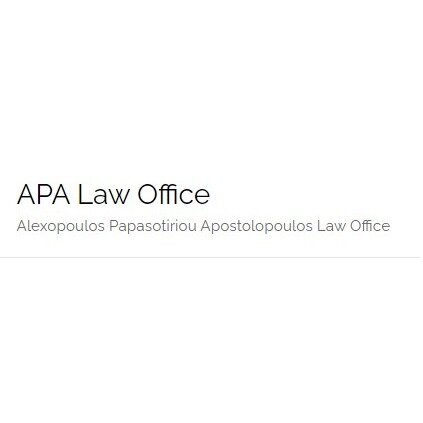Best Creditor Lawyers in Greece
Share your needs with us, get contacted by law firms.
Free. Takes 2 min.
Or refine your search by selecting a city:
List of the best lawyers in Greece
About Creditor Law in Greece
Creditor law in Greece encompasses the legal framework which governs the rights and responsibilities of creditors and debtors. This field of law deals with how creditors can collect debts and the protections afforded to debtors under Greek law. It includes a variety of legal concepts, from bankruptcy and insolvency proceedings to secured transactions and consumer protection. Greek creditor laws are primarily guided by the Greek Civil Code and further influenced by European Union regulations, aiming to ensure fair practice in debt recovery while protecting the rights of consumers.
Why You May Need a Lawyer
There are several common situations where individuals or businesses may require legal advice in the realm of creditor law:
- Attempting to recover overdue payments from a debtor who is unwilling or unable to pay.
- Facing bankruptcy or insolvency proceedings either as a creditor or debtor.
- Need assistance in negotiating settlement agreements with creditors.
- Challenging unfair debt recovery practices or usurious lending rates.
- Structuring secured transactions and understanding the priority of security interests.
Local Laws Overview
The main legal statutes governing creditor-debtor relationships in Greece include:
- The Greek Civil Code: Establishes fundamental law on contract and debt obligations.
- The Greek Bankruptcy Code: Provides the legal framework for declaring insolvency and the proceedings that follow.
- The Consumer Protection Law: Offers protection to consumers against unfair practices, which includes transparency requirements in lending.
- The Code of Conduct for Debt Servicing and Collection: Regulates how financial institutions can interact with debtors when recovering outstanding debts.
Frequently Asked Questions
What is the limitation period for debt recovery in Greece?
In Greece, the general limitation period for debt recovery is five years from the date the debt becomes due. However, this period can vary based on specific types of debts or contractual agreements, so it's essential to seek legal advice for your particular situation.
Can interest rates on debts be freely negotiated?
While parties can negotiate interest rates, they must remain within the legal limits set by Greek law. Usurious rates can be challenged and deemed unenforceable in court.
What legal actions can a creditor take if a debtor refuses to pay?
A creditor can issue a final demand for payment, initiate legal proceedings to obtain a court judgment, and potentially enforce payment through asset seizure or garnishment orders, following the court's approval.
How does bankruptcy affect creditors’ rights in Greece?
When a debtor declares bankruptcy, creditors are generally prohibited from pursuing individual collection actions and must instead submit claims through the bankruptcy court proceedings to receive any part of the debtor’s remaining assets.
What is a secured transaction?
A secured transaction is one in which the debtor provides collateral to the creditor to secure a debt. This collateral gives the creditor a priority right to be paid from the proceeds if the debtor defaults.
How are consumer debts regulated in Greece?
Consumer debts are regulated under the Consumer Protection Law, which includes provisions to prevent abusive collection practices and ensures creditors disclose essential terms of consumer credit agreements.
Can a creditor garnish wages in Greece?
In Greece, creditors can garnish a debtor's wages but only after obtaining a legal judgment for the debt. There are also limitations to ensure debtors retain sufficient income for living expenses.
What rights do debtors have against unfair collection practices?
Debtors are protected under the Code of Conduct for Debt Servicing and Collection. This includes the right to be treated fairly and respect for privacy, among other protections.
How can a creditor enforce a foreign judgment in Greece?
Enforcing a foreign judgment entails a separate procedure in Greek courts to recognize and enforce the judgment based on international treaties or reciprocity agreements.
Can interest continue to accrue on a debt after a legal judgment?
Yes, interest can continue to accrue on the outstanding amount unless otherwise specified by a court order or a specific agreement between the parties involved.
Additional Resources
For further assistance and resources related to creditor law in Greece, you may consider reaching out to the following:
- The Greek Ministry of Justice
- Hellenic Financial Ombudsman
- Greek Chamber of Commerce and Industry for business-related advice
- Local bar associations for referrals to qualified debt recovery lawyers
Next Steps
If you require legal assistance in dealing with creditor issues, consider the following steps:
- Identify the specific nature of your creditor issue, such as debt recovery, bankruptcy, or contract disputes.
- Consult with a specialized lawyer to assess your situation, explore options, and understand potential legal outcomes.
- Gather all relevant documents, such as contracts, communication records, and any previous court judgments.
- Engage with legal counsel to develop a strategic approach tailored to your objectives, whether pursuing debt recovery or defending against collection actions.
Lawzana helps you find the best lawyers and law firms in Greece through a curated and pre-screened list of qualified legal professionals. Our platform offers rankings and detailed profiles of attorneys and law firms, allowing you to compare based on practice areas, including Creditor, experience, and client feedback.
Each profile includes a description of the firm's areas of practice, client reviews, team members and partners, year of establishment, spoken languages, office locations, contact information, social media presence, and any published articles or resources. Most firms on our platform speak English and are experienced in both local and international legal matters.
Get a quote from top-rated law firms in Greece — quickly, securely, and without unnecessary hassle.
Disclaimer:
The information provided on this page is for general informational purposes only and does not constitute legal advice. While we strive to ensure the accuracy and relevance of the content, legal information may change over time, and interpretations of the law can vary. You should always consult with a qualified legal professional for advice specific to your situation.
We disclaim all liability for actions taken or not taken based on the content of this page. If you believe any information is incorrect or outdated, please contact us, and we will review and update it where appropriate.
Browse creditor law firms by city in Greece
Refine your search by selecting a city.
















